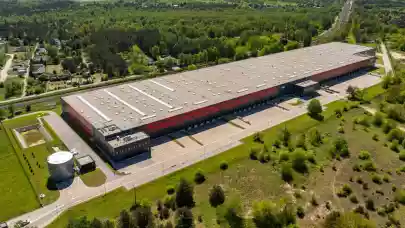
Jarosław Fiutowski, Member of the Board responsible for ESG strategy and innovation at Ghelamco Poland, talked to Property Forum about the renewable energy in office buildings, the awareness of ESG issues among tenants and the related stance of Western investment funds.
In the spring of 2022, Ghelamco Poland announced that it would achieve energy neutrality by the end of 2024, with all its office buildings powered entirely by its own renewable energy sources. Do you stand by this declaration?
We definitely stand by our intention to achieve energy neutrality, it is a key element of our ESG strategy that we are consistently implementing. As we have announced, we are aiming to meet this target by 2025 and we are on track to succeed.
How is the construction of your solar farms in the Opole region progressing?
We already have three photovoltaic farms ready there, one of which has been in operation since November 2023, and the other two we plan to launch in the coming weeks. Opolskie is not the only region in Poland where our farms have been built - they have also been erected in the Pomorskie, Wielkopolskie and Warmińsko-Mazurskie Voivodeships - a total of eight more farms; we are now waiting for them to be connected to the grid and put into operation. Our first building to benefit from this solution is the Warsaw UNIT skyscraper. We are not stopping there and are committed to further developing our renewable energy infrastructure.

Jarosław Fiutowski
Member of the Board
Ghelamco Poland
You were the first real estate company in Poland to join the international Science Based Targets (SBTi) initiative. What was behind this decision? What does this give you as a company?
Joining SBTi was a natural step for us on the road to sustainability. It will enable us to work even more effectively to reduce greenhouse gas emissions and combat global warming, with major international organisations among our allies. This complements our actions from a corporate position, as our projects are already at the absolute Polish and even European forefront when it comes to meeting the highest standards in sustainable construction. Presence in such structures, in addition to the possibility of cooperation and exchange of experience with other members, also lends credibility to our efforts and actions towards zero carbon.
Your achievements in the environmental field are unquestionable and put you at the national forefront in this respect. What about the "S" and "G"?
Achievements in the environmental field are extremely important, but the social and so-called corporate governance aspects are equally important to us. We strive for a balance in all ESG areas, as we believe they are key to the sustainability of the company. ‘Social’ activities have been present in our strategy for years and we have been a pioneer in this field in the Polish real estate market - let us recall, for example, the creation and handing over to the residents of Warsaw the European Square, where for years Ghelamco organised numerous cultural and entertainment events activating the local community. To this day, we still organise regular art exhibitions here at the open-air Art Walk gallery, open to everyone at any time of the year and day. We can also include in the ‘S’ category all that is related to the broadly defined well-being of our employees and tenants. This is confirmed by the highest possible Platinium rating in the WELL Core certification for Warsaw UNIT.
Equally important to us is the ‘G’, or so-called corporate governance, the proper management of policies within the organisation. We don't talk about this out loud because it is not a strong marketing aspect. Certain standards have become our everyday life and we take them for granted today, such as gender equality, diversity policy, transparency of operations, etc. For example, at Ghelamco, a company operating in a heavily male-dominated industry, more than 50 per cent of employees are women.
How do you assess the awareness of ESG issues among office tenants in Poland? Are they willing to pay more to rent a 'green office'?
This awareness is definitely growing, and the sustainability of the building is becoming one of the key criteria when choosing an office. Our tenants often emphasise that it was the environmental aspect, alongside location, that was particularly important to them. Still, few tenants are prepared to pay more rent because of this. However, they come out well in the long term because green, smart buildings are more optimised in terms of utility consumption, making them more energy efficient. Regardless, green, sustainable office buildings are also far more competitive and are the ones winning the battle for customers today.
Western investment funds like developers who build with sustainability in mind. Does your ESG activity translate into more interest in your buildings from potential buyers?
ESG is now crucial not only for tenants but even more so for funds that invest in commercial real estate long-term. Buildings that do not hold to sustainable standards are virtually unsellable today. Investors no longer ask whether a building is environmentally certified, but at what level. Obtaining a BREEAM or LEED certificate for a building to confirm that it was realised in a sustainable manner is an absolute standard, and WELL, which focuses on the end user, is also becoming increasingly important. Their absence severely reduces the attractiveness of a property or puts it off the market altogether. Does a property lacking these certifications have a reduced value? Probably yes. It is very difficult to calculate this value, but what is important is that the absence of these certificates can exclude a property from the list of purchase products in the funds. This is fundamental for organisations that are primarily looking to dispose of a property once it has been commercialised.



